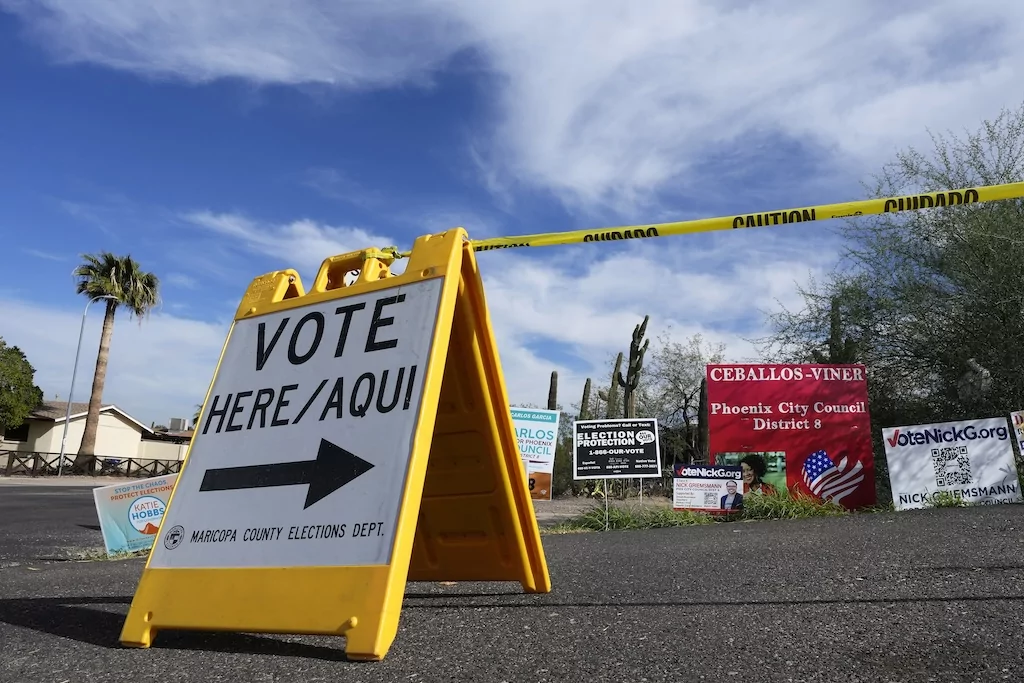

Four months out from Election Day, activists are still fighting over the rules that will dictate how voters cast their ballots, including in swing states. The parties are preparing for legal battles if the results are close, as they were four years ago. In this series, the Washington Examiner will look at the battles over election rules. Part one looked at absentee voting. Part two will look at voter registration.
Voter registration and canvassing laws are hotly contested any year, but with the presidential election looming, the election rules are coming under increased scrutiny in key swing states.
Recent contentious elections have seen an increase in challenges to voting law. Against the backdrop of the pandemic, the 2020 election saw a crescendo in fights over voting laws, including on voter registration and canvassing. As voters across the country get ready to vote in what’s shaping up to be a rematch of the 2020 presidential election in November, these are some of the latest battles in key swing states have fared.
Arizona
In the Grand Canyon State, the fight over a voter registration law has seen setbacks for a GOP-backed bill looking to require proof of citizenship.
A federal court blocked a provision of a state law, which would mandate proof of citizenship for voting in federal elections in the state, earlier this year, and it recently denied a bid to stay the injunction pending appeal. The court has not blocked the proof of citizenship requirement for state elections.
Another court fight brewing in the state has to do with alleged discrepancies in the voter rolls, leaving them full of ineligible voters. The Arizona Republican Party and the Arizona Free Enterprise Club, in a lawsuit filed earlier this month, alleged that there are between 500,000 and 1.27 million invalid registrations on the state’s books. Arizona Secretary of State Adrian Fontes, a Democrat, has filed a motion to dismiss the lawsuit.
The presidential race in Arizona is expected to be tight in November. President Joe Biden beat former President Donald Trump in 2020, but the RealClearPolitics polling average shows Trump leading Biden by 5.6%.
Georgia
In Georgia, election laws since the 2020 elections have made headlines for how state lawmakers have changed election procedure, but a law passed in 2024 adds a new dimension ahead of a critical election in the Peach State.
A bill signed into law by Gov. Brian Kemp (R-GA) in May outlines policies for when a voter should be taken off of the voter rolls. The law says it is probable cause to remove a voter from the rolls if there is evidence of the voter casting a ballot or registering somewhere else, using a nonresidential address, or indicating a primary residence somewhere else. The law stipulated that a voter’s registration may not be removed within 45 days of an election.
Like Arizona, the traditionally Republican state voted for Biden over Trump in 2020, but Trump is currently leading in the RealClearPolitics polling average. The polling average shows Trump leading Biden by 4%.
Michigan
In Michigan, various election reforms have taken place since the 2020 election, but the voter rolls featured in a recent lawsuit brought by the GOP.
The Republican National Committee filed a lawsuit against the state, alleging it had failed to clean its voter rolls adequately in compliance with the National Voter Registration Act of 1993. In the lawsuit, the RNC claims that “53 Michigan counties have more active registered voters than they have adult citizens who are over the age of 18.”
Michigan Secretary of State Jocelyn Benson, a Democrat, has filed a motion to dismiss the lawsuit and has defended her record on keeping the voter rolls clean of inactive voters.
The Great Lakes State has been traditionally hard for Republicans to flip in recent presidential elections, although Trump was able to do it in 2016 before losing it to Biden in 2020. Trump is leading Biden in the RealClearPolitics polling average by 1.2%.
Pennsylvania
In the Keystone State, vote canvassing has faced a challenge in one county due to how it was allegedly carried out in 2023.
The American Civil Liberties Union filed a lawsuit earlier this year challenging the York County Board of Elections for allegedly not permitting nonpartisan observers to watch the vote canvassing process. The group is seeking to have its vote canvassing process changed for the 2024 election to allow observers in the high-stakes race that could decide the presidency.
CLICK HERE TO READ MORE FROM THE WASHINGTON EXAMINER
In Pennsylvania, Trump won in 2016, becoming the first Republican presidential candidate to do so since 1988, but failed to repeat the feat in 2020. With just over four months until the 2024 election, Trump leads Biden by 3% in the RealClearPolitics polling average in the state.
Given how close the handful of swing states are anticipated to be, election challenges for procedures in battleground states could prove significant for Biden and Trump.







